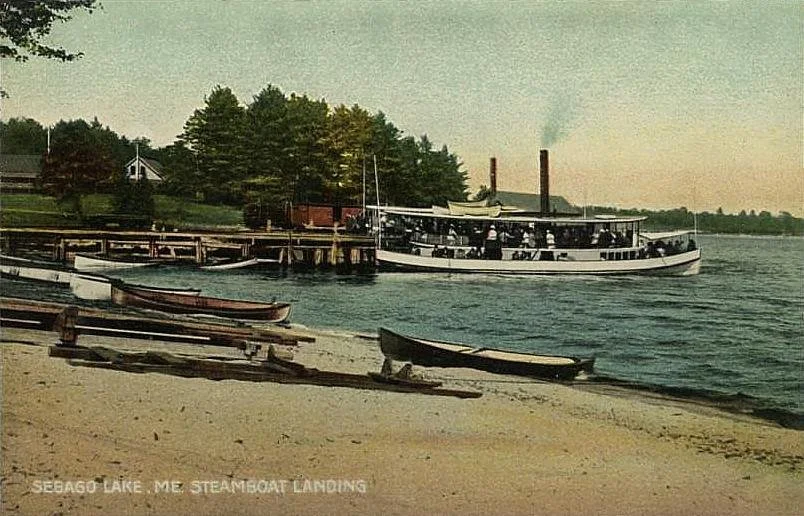Lake life
1910 postcard. Sebago has been a summer resort area since the Civil War.
Our friends' house along part of Sebago Lake, with now lawn.
We drove up to the Sebago Lake complex, northwest of Portland, Maine, last week, to see some friends there. They’re based in Los Angeles but have built a house on Sebago. It’s mostly for summer, but they use it from time to time in other seasons, too. They love Maine, with its woods, fabled coast and lakes, in part because it’s so different from dry Southern California, whose many fires have distressed them.
The area around their Maine place is becoming increasingly eco-friendly; I suspect that may be driven in part by the wave of affluent newcomers, which got higher in the pandemic as people fled big cities. That disaster led some summer and weekend residents to move to Maine full time. But most native Mainers, including poor ones, also seek to protect The Pine Tree State’s environment. There’s plenty of poverty in Maine, and most of the wealth is along the coast from Kittery to Acadia National Park.
To protect their gorgeous setting and its resources requires taking away some freedoms. A local rule applying to our friends’ immediate area bans new lawns along the water; old ones are grandfathered in. The rule is meant to curb pollution from the fertilizers, herbicides and pesticides that many property owners dump on their lawns to keep them looking like a swatch of golf course and that end up in the lake. The rule also, of course, helps curb shoreline erosion, which is less from woods than lawns.
An important factor in rules about Sebago is that it’s the main source of Portland’s water.
Instead, people such as our friends have shrubs and other low vegetation, say two or three feet high, between their house and the water. This has a nice effect as you look at the shining water from their big windows.
As for the freedom to put a lawn next to the lake: Surely locals should also have the freedom of being able to use a clean lake. It reminds me of the MAGA battles against having to wear a face mask to reduce COVID spread in crowded places. How about the freedom to go around without fear that an infected person in a pandemic will get you very sick?
Then there’s the grossly misinterpreted (and badly written ) state-militia-promoting Second Amendment, which MAGA types wielding military-style assault rifles say is essential for their freedom to defend themselves.
How about the freedom to be in public places, including schools, without the fear of being gunned down by yet another young man with a weapon designed to mow down people by the dozens, not just a lone criminal or lunatic.
One person’s “freedom’’ is another’s captivity. There will always be battles.
xxx
Besides such joys as the beauty of the fall foliage, which was heading into its height up there, and the sun glimmering on the lake, our visit gave me a greater appreciation of the beauty of granite – the quintessential stone of the region. On our friends’ property we saw granite boulders, left by the last Ice Age and the bane of old Yankee farmers, artfully used in landscaping, and the effects achieved by the use of granite for steps, terraces and indoor work, such as countertops and even benches at the side of fireplaces.
Our friends told us about the Orland, Maine, company called Fresh Water Stone that created exquisite granite work for them, such as the terrace in this picture. (I have no commercial, or other connection with the company.)
Stonework is just one example of why the state is renown for its artisans. Consider the long tradition of its boatbuilders, furniture and tool makers, painters, sculptors, ceramists, leather-goods designers, and so on.
Meanwhile, I read about arguments in Maine, as elsewhere, about farmers selling off or leasing land for solar farms. Each local case is different, of course, but it seems to me that reducing local agricultural production can undermine the battle against global warming since it means that more food must be shipped from far away, thus burning more fossil fuel. Can’t many more roofs and abandoned lots be venues for solar panels instead of putting them on farmland or chopping down trees, those crucial carbon-dioxide absorbers?
I’ve noticed a paradox up there: Some of those who don’t like the famously long winters at the same time worry that they’re getting too short and warm, ruining such local activities as ice fishing and allowing in invasive animals and plants from the south.

